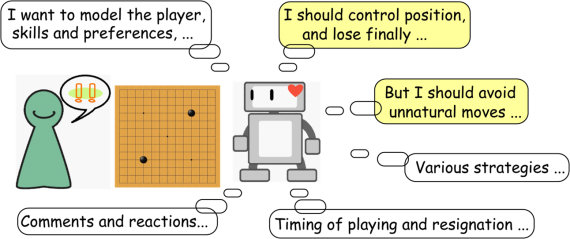
Not only Strong, but also Human-like, Entertaining or Educating Computer Game Players
Laboratory on Game Informatics
Professor:Ikeda Kokolo
E-mail:
[Research areas]
Game Informatics, Machine Learning
[Keywords]
Computer Game Player, Entertainment, Education, Procedural Content Generation, Reinforcement Learning, Genetic Algorithm, Monte-Carlo Tree Search
Skills and background we are looking for in prospective students
- Basic Mathematic concepts, such as set, function, probability, combination and graph.
- Intermediate programming (100+ lines) skill in any language, such as C#, Java, Python.
- Enthusiasm for games, further, complaints about games.
What you can expect to learn in this laboratory
- Expert knowledge about Game Informatics, such as MCTS or Reinforcement Learning
- IT skills including AI such as Machine Learning or Optimization, and programming skills
- General skills as intelligent workers, such as writing reports, presentation, problem-solving, problem finding, analysis, scheduling, and self-control.
【Job category of graduates】 Mainly System Engineer or Researcher, sometimes Game Developer
Research outline
[Background]
Game is a very important culture of human beings. We play many games, and some of them such as Chess has been considered as the symbol of intelligence. Recently, according to the progress of artificial intelligence (AI) technologies and computers, very strong computer players have been achieved in many games, such as Chess or Go. However, this fact doesn't mean the end of Game Informatics but mean the beginning of advanced Game Informatics for entertaining human players.
[Human-like Computer Players]
We human players are different from computer players, in many points. Physically, some noise is introduced to image recognition, thinking and neurotransmission make a delay of action, etc. Psychologically, we enjoy, fear, or are surprised. To understand the human-likeness and to reproduce it as a human-like computer player are valuable topic now. Ikeda-lab intensively studies this topic and apply the technology to many games and many purposes.
[Entertaining and Educating Players]

Figure: six requirements for entertaining player
It is well known that a strong player is not necessarily a good coach. Many more skills are needed to be a good coach than a strong player. Good coaches must understand the skill and preference of students, play gently and naturally, give a chance student to win, and praise well, and point some wrong moves of student with training problems. Some good results have been achieved in coaching Go, but we want to improve and extend such coaching AI methods more deeply.
[Procedural Content Generation]
Recently, game content is created not only by hand but also automatically. Players can enjoy randomly made dungeons, stages, or puzzles. However, sometimes the contents are too easy or too difficult for human players, mainly because such contents are tested/evaluated by not-human-like AI agents. Ikeda-lab tries to understand the weakness of human players, make human-like test agent, and then generate good contents special to human players, or to a player.
Key publications
- Chu-Hsuan Hsueh and Kokolo Ikeda, Playing Good-Quality Games with Weak Players by Combining Programs with Different Roles, IEEE CoG, 2022
- Keita Fujihira et.al, Procedural Maze Generation with Considering Difficulty from Human Players’Perspectives, ACG, 2021
- SangGyu Nam, Kokolo Ikeda, Generating Stages in Turn-Based RPG using Reinforcement Learning, IEEE CoG, 2019
Equipment
- PC with GPU for each
- 10 UNIX servers with 24-32 cores for lab
Our lab's strength in Transdisciplinary Sciences
In our lab, by using various AI methods, researches are conducted for making the relationship between human and games more enjoyable. While the primary target of game informatics has been to make computer players stronger than human players, our target is to entertain or coach human players. For this purpose, we should know human beings. For example, we want to know when human players feel fun and which kind of weakness or cognitive biases they have. In transdisciplinary sciences, we can communicate and discuss with various researchers who deal with human beings, and we can expect to conduct valuable researches using novel approaches.
[Website] URL:https://www.jaist.ac.jp/is/labs/ikeda-lab/